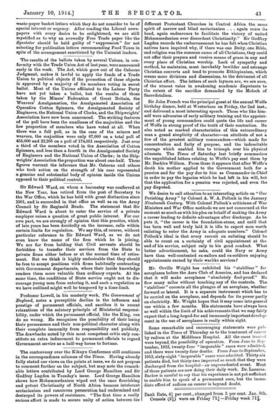The results of the ballots taken by several Unions, in
con- formity with the Trade Union Aot of last year, were announced -early in the week. The Act, which grew out of the Osborne Judgment, makes it lawful to apply the funds of a Trade 'Union to political objects if the promotion of these objects is approved by a majority of its members voting in secret ballot. Most of the Unions affiliated to the Labour Party have not yet taken a ballot, but the results of those taken by the Miners' Federation of Great Britain, the Weavers' Amalgamation, the Amalgamated Association of Operative Cotton Spinners, the Amalgamated Society of Engineers, the National Union of Clerks, and the Shipwrights' Association have now been announced. The striking features of the poll have been the smallness of the majorities and the low proportion of members who have voted at all. When there was a fell poll, as in the case of the miners and weavers, the majorities were only 67,000 on a total poll of 455,000 and 22,265 on a poll of 174,051 respectively. Just over a third of the members voted in the Association of Cotton Spinners, and less than a fourth in the Amalgamated Society of Engineers and the National Union of Clerks ; in the Ship- wrights' Association the proportion was about one-half. These figures warrant the inference that Mr. Osborne and others who took action on the strength of his case represented a genuine and substantial body of opinion inside the Unions opposed to their political control.






































 Previous page
Previous page